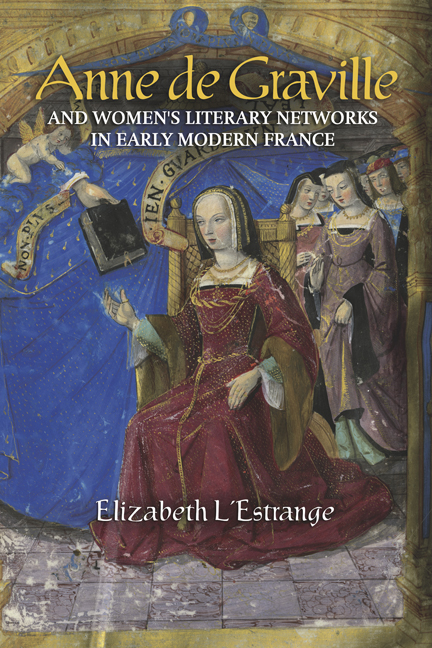Book contents
- Frontmatter
- Dedication
- Contents
- List of Illustrations
- Acknowledgements
- A Note on Citations, Translations and Transcriptions
- List of Abbreviations
- Map
- Introduction: ‘Une femme d’excellence en vertus, ma dame d’Entraigues’: Anne de Graville’s Life and Works
- PART I ANNE DE GRAVILLE: READER AND COLLECTOR
- PART II FROM READING TO WRITING: ANNE AS AUTHOR
- Conclusion: ‘Celle la qui porte le regnon’: A Last Word on Anne de Graville
- Appendix A Books Inherited, Acquired, Commissioned by or Associated with Anne de Graville
- Appendix B Inventory of the d’Urfé Library at La Bâtie, c. 1780
- Appendix C Manuscripts Containing Works by Anne de Graville
- Bibliography
- Index
- Gallica
4 - Musas natura, lachrymas fortuna: Anne de Graville, Christine de Pizan and Women’s Shaping of the querelle des femmes
Published online by Cambridge University Press: 11 January 2024
- Frontmatter
- Dedication
- Contents
- List of Illustrations
- Acknowledgements
- A Note on Citations, Translations and Transcriptions
- List of Abbreviations
- Map
- Introduction: ‘Une femme d’excellence en vertus, ma dame d’Entraigues’: Anne de Graville’s Life and Works
- PART I ANNE DE GRAVILLE: READER AND COLLECTOR
- PART II FROM READING TO WRITING: ANNE AS AUTHOR
- Conclusion: ‘Celle la qui porte le regnon’: A Last Word on Anne de Graville
- Appendix A Books Inherited, Acquired, Commissioned by or Associated with Anne de Graville
- Appendix B Inventory of the d’Urfé Library at La Bâtie, c. 1780
- Appendix C Manuscripts Containing Works by Anne de Graville
- Bibliography
- Index
- Gallica
Summary
Around one hundred years before Anne de Graville offered her works to Queen Claude and Louise of Savoy, another woman, more famous to scholars today, also embarked on her literary career at the French court. Christine de Pizan had come there in the 1360s when her father, Tommaso di Pizzano, became astrologer to Charles V; in 1380 she mar-ried Etienne de Castel, the king's secretary, a union that probably gave her access to the royal library. When Charles V died in 1380, her father suffered a serious downturn in his status and health, and in 1388 he passed away. His death was followed a year later by that of Christine's husband. Finding herself at the bottom of Fortune's wheel, Christine began her literary activity as a means to support herself, her young family and her elderly mother. Her output was prolific, and she authored numerous texts in both poetry and prose that dealt with questions of conduct, good government, war and peace, courtly love and the benefits of study. She remains best known, however, for her engagement in the querelle de la Rose, in which she took issue with the misogyny and immorality in Jean de Meun's continuation of the Roman de la Roseand, later, her participation in the querelle des femmes. The Livre de la Cité des dames, written around 1405, was a major intervention in the debate about women in which she ‘tackles the problem of misogyny head-on, offering an alternative view of history in which women's contribution as historical figures is fully recognised’. After 1430, most aristocratic women's libraries in France included at least one, if not all three, of Christine's most pro-feminine texts, the Cité, the Epistre Otheaand the Livre des trois vertus (Le Trésor de la Cité des dames), often in conjunction with one of the French translations of Boccaccio's De mulieribus claris.
The aim of this chapter is three-fold. First it explores Anne de Graville's knowledge of and interaction with Christine de Pizan, and with the querelle des femmesmore broadly. The similarities between the two women cannot have been lost on Anne: both women were victims of the vagaries of Fortune, both were pro-feminine writers seeking the patronage of women at the French court and both had themselves represented as authors in copies of their works.
- Type
- Chapter
- Information
- Publisher: Boydell & BrewerPrint publication year: 2023



